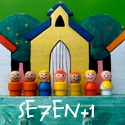Kids, social problems, and government control
The Australian media often features articles about the growing obesity problem amongst children. There are currently many discussions happening as to whether or not the government should implement such measures as advertising restrictions for fast food, and a junk food tax. Patricia Edgar, in her article "Nothing in it for Tomorrow's citizens" (The Australian, Thursday September 21, 2006), wrote that advertising should be restricted. According to Edgar, "The number of overweight people on the planet - more than one billion - exceeds the number of malnourished".
Yet this was not the central focus of Edgar's article. Rather, she lamented the lack of quality children's TV programs. "Today children spend more time with machines than with their parents." Edgar's concern is that what is shown to children promotes a culture of materialism. "Brands are ubiquitous and the fight to resist is overwhelmind for parents. We feed our kids toxic food. We have squandered TV's capacity to teach, inform and inspire."
Edgar's assessment of children's media is certainly one I would echo. Due to my babysitting and teaching experiences, I am increasingly aware that the media marketed to children is problematic. One of my main pet hates is the Bratz craze. Bratz dolls are heavily made up and scantily clad. There are movies featuring them, and merchandise ranging from shoes to pencil cases. One child I teach, age 6, seems to have Bratz everything. Images of purity and gracious femininity have been overtaken by sensuality and rebellion. This is just one example.
While I agree that children's media consumption is a concern, I am less impressed with Edgar's solution: government intervention and better early childhood education. "A national strategy for children must include the media." Such a conclusion assumes that the government is responsible for what parent's allow their children to watch on TV, or what parents choose to buy their children at the shopping mall. I believe that parents are responsible, not governments.
God gives the responsiblity for children's education to parents. All stories, including those told on TV, are "education". The Bible is full of stories, indicating the importance God places upon them. There is no such thing as "just a story". The tales the TV spins hour after hour, whether in advertising or programs, are not neutral. Parents are responsible for what type of stories they allow their children to be told.
One reason I think parents resist fulfilling their responsibilities properly, is a fear that their children will be "weird" if they are not soaked in popular culture. Christian parents at least, seeing the usual rebellious and unhappy children of the world, should want their children to be weird. If I have children, I want them to relate well to others and the world. Today, success in that goal would make them very weird.
Parents, even those who are not believers, can and should choose to fill their children's lives with stories that are good. Stories around the dinner table that impart family history and identity. Stories of nature and beauty, and of the character and virtues that they want their children to have. As an aunt, I also count myself responsible to tell good stories. Tales that inspire children to live beautiful lives.
If parents will not choose to fill their children's lives with stories that will infuse their lives with hope and purpose, no one else can fill that gap. The government can make what regulations it likes. The child care centers can be encouraged to implement, as Edgar suggests, "quality early childhood programs that employ drama, music, and information to enrich the lives of children". None of that can ever compare with the pattern God gives us in the Bible: parents walking beside their children, and telling them the stories they need to know.








